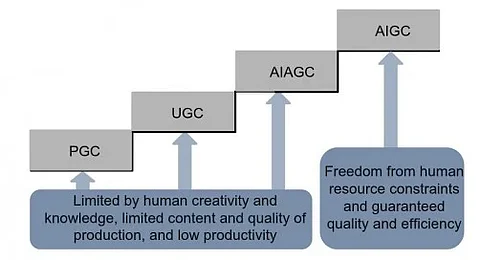Text generation has gone through professionally generated content (PGC), user-generated content (UGC), AI-assisted generated content (AIAGC), and AI-generated content (AIGC). Among them, AIGC can completely break away from the limitations of factors such as human manufacturing capabilities, imagination, and knowledge level, ensuring the quality and quantity of generated text. AIGC text generation can be divided into three categories: utility text generation, such as generating news and reports, which emphasizes practicality and standardization; creative text generation, such as literary creation and advertising copy, which focuses on innovation and artistry; and emotive text generation, such as chat responses that simulate human emotions, which focuses on emotional expression and adaptability. These three generation methods have their own characteristics in terms of efficiency, innovation, etc.
The paper discusses technical solutions for text generation, including classifications based on rule-based, statistic-based, deep learning-based, and hybrid methods. Early rule-based methods rely on predefined rules and templates, which are controllable but have low flexibility; statistic-based methods generate text through statistical information such as word frequency and sentence position, which are efficient but lack semantic understanding; deep learning-based methods such as Encoder-Decoder models and pre-trained language models (such as the GPT series) improve semantic understanding and generation quality through deep learning and have become mainstream; hybrid methods combine the advantages of multiple technologies but have high system complexity. Experiments show that pre-trained models perform optimally in terms of performance.
Text generation technology has been widely applied in many fields. In the news field, it can automatically generate headlines, summaries, and structured news; in the field of literature and libraries, it can generate literature abstracts, book introductions, etc., improving service efficiency; in the field of information retrieval, it assists in summary generation and text clustering, optimizing the search experience; in addition, in fields such as academic research, business analysis, law, and medical care, text generation technology can also help quickly extract key information, improving the efficiency of various industries.
AI text generation faces many challenges: the black-box nature of deep learning models leads to insufficient interpretability, affecting error analysis; knowledge acquisition requires a large amount of standardized data, with high update costs; generated text may have problems with fluency, authenticity, and source traceability; existing automatic evaluation metrics are difficult to accurately measure text quality; large models have high computing costs, bringing resource and environmental challenges; in addition, AI-generated content may also trigger copyright disputes, requiring clear ownership of rights.
In the future, AI text generation will develop in the directions of improving quality and efficiency, enhancing social interactivity, supporting multilingual and cross-cultural generation, developing lightweight models, and improving ethical governance. As technology matures, text generation will become more automated and personalized to meet diverse needs. Although models such as ChatGPT have promoted industry innovation, attention must be paid to data privacy and ethical issues. In general, intelligent text generation will become an important field in the future development of multimodal AI. [News Wise/VP]
Also Read:


